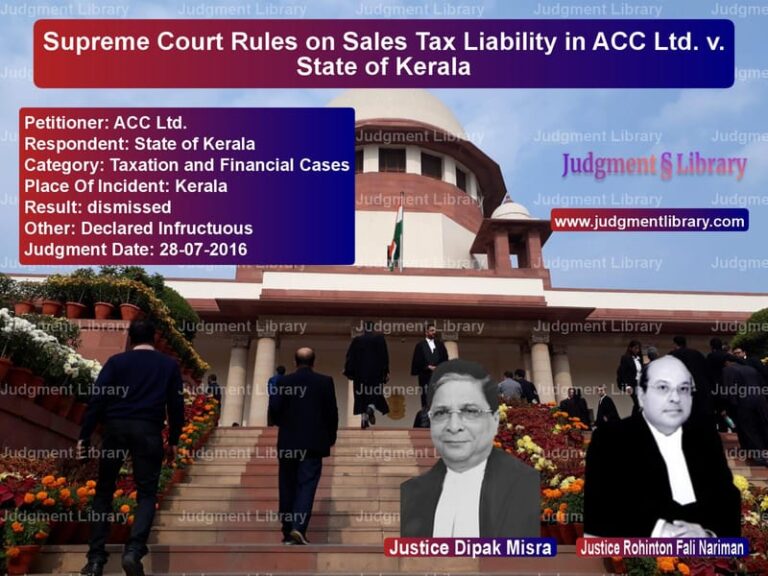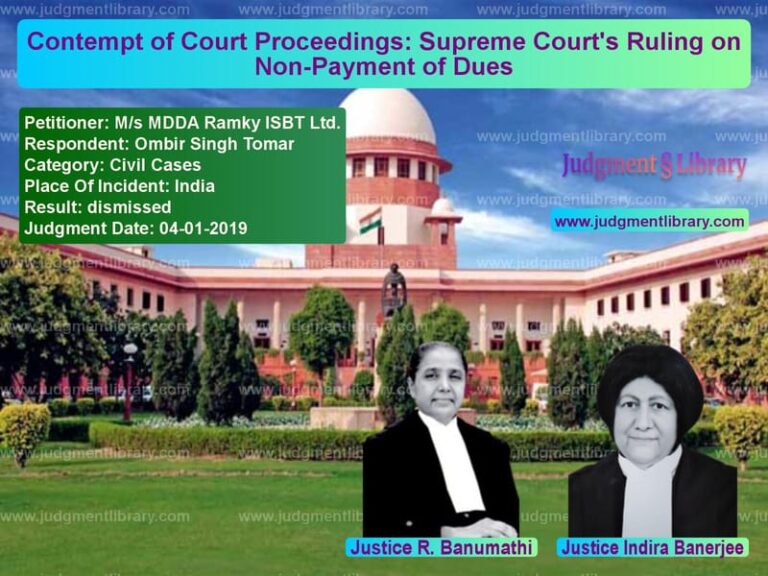Service Tax Exemption: Supreme Court Rules in Favor of Signode India in Cargo Handling Dispute
The Supreme Court of India delivered a significant ruling in the case of Signode India Limited vs. Commissioner of Central Excise & Customs-II, where it examined the applicability of service tax on packaging activities. The central issue was whether the services provided by the appellant fell under “cargo handling services” as per Section 65(23) of the Finance Act, 1994, or were instead “packaging activities” introduced under Section 65(76b) through an amendment in 2005.
Background of the Case
The appellant, Signode India Limited, was engaged in providing packaging services for goods at the manufacturing facility of Tata Refractories Limited. The tax authorities had levied service tax on Signode India, contending that the services rendered constituted “cargo handling services,” making them liable under the Finance Act, 1994. However, Signode India argued that its services were packaging activities, which were separately made taxable from June 16, 2005, and therefore, it was not liable to pay service tax before that date.
Key Legal Issues
- Whether the appellant’s services constituted “cargo handling” as per Section 65(23) of the Finance Act, 1994.
- Whether “packaging activity” and “cargo handling service” are distinct services under the law.
- Whether the appellant was liable for service tax for the period before June 16, 2005.
Petitioner’s Arguments (Signode India Limited)
The appellant argued that:
- Its activities were limited to packaging goods before they left the factory premises.
- Packaging activities were separately recognized and made taxable under the Finance Act amendment of 2005.
- The company was already paying service tax under “packaging activities” post-June 16, 2005.
- Prior to the amendment, “cargo handling services” did not include packaging within a factory.
- The demand for service tax for the period before 2005 was unjustified and inconsistent with legislative intent.
Respondents’ Arguments (Commissioner of Central Excise & Customs-II)
The tax authorities contended:
- Packaging was included under “cargo handling services,” which covered loading, unloading, packing, and unpacking of cargo.
- The appellant’s services were integral to the transportation of goods and, therefore, fell within the definition of “cargo handling.”
- The demand for service tax before June 16, 2005, was valid as the activities undertaken contributed to handling cargo.
Supreme Court’s Observations
The Supreme Court examined the definitions provided under the Finance Act:
- Section 65(23) defines “cargo handling services” to include “loading, unloading, packing, or unpacking of cargo” but excludes handling of export cargo, passenger baggage, or mere transportation of goods.
- Section 65(76b) (introduced in 2005) defines “packaging activity” as “packaging of goods, including pouch filling, bottling, labeling, or imprinting of the package.”
The Court noted the legislative intent behind these amendments:
“The amendment to the Finance Act in 2005 clearly indicates that packaging activity is different from cargo handling. Applying the pre-amendment law to packaging activities would run counter to legislative intent.”
The Court also considered the dictionary definitions of “cargo” and “goods” to highlight the difference:
- “Cargo” refers to goods transported by a vessel, airplane, or vehicle.
- “Goods” refer to items before they are transported.
The Court concluded that packaging goods at the manufacturer’s facility was a pre-transportation activity and did not fall under cargo handling.
Supreme Court’s Ruling
- The demand for service tax on Signode India Limited before June 16, 2005, was set aside.
- The Court ruled that packaging activities were distinct from cargo handling and were not taxable under the pre-amendment Finance Act.
- Since the Revenue had not disputed Signode India’s payment of service tax under “packaging activities” post-2005, there was no basis for levying tax for the earlier period.
The Court further observed:
“Since the legislature made packaging a separate taxable category in 2005, it is evident that it was not taxable as cargo handling before that. The appellant’s services cannot be retrospectively taxed under a different category.”
Key Takeaways from the Judgment
- The Court reaffirmed that tax laws must be applied as per legislative intent and not retrospectively.
- Packaging activities performed within factory premises do not constitute “cargo handling services.”
- Amendments clarifying tax liabilities must be respected, and authorities cannot demand retrospective tax payments under different categories.
Conclusion
The Supreme Court’s ruling in Signode India Limited vs. Commissioner of Central Excise & Customs-II provides clarity on the distinction between “cargo handling services” and “packaging activities.” By setting aside the tax demand for the pre-2005 period, the judgment upholds the principle of non-retroactivity in tax laws, ensuring that taxpayers are not unfairly burdened with retrospective liabilities.
Don’t miss out on the full details! Download the complete judgment in PDF format below and gain valuable insights instantly!
Download Judgment: Signode India Limite vs Commissioner of Cent Supreme Court of India Judgment Dated 08-03-2017.pdf
Direct Downlaod Judgment: Direct downlaod this Judgment
See all petitions in Income Tax Disputes
See all petitions in Tax Evasion Cases
See all petitions in Banking Regulations
See all petitions in Judgment by Ranjan Gogoi
See all petitions in Judgment by Navin Sinha
See all petitions in allowed
See all petitions in supreme court of India judgments March 2017
See all petitions in 2017 judgments
See all posts in Taxation and Financial Cases Category
See all allowed petitions in Taxation and Financial Cases Category
See all Dismissed petitions in Taxation and Financial Cases Category
See all partially allowed petitions in Taxation and Financial Cases Category







